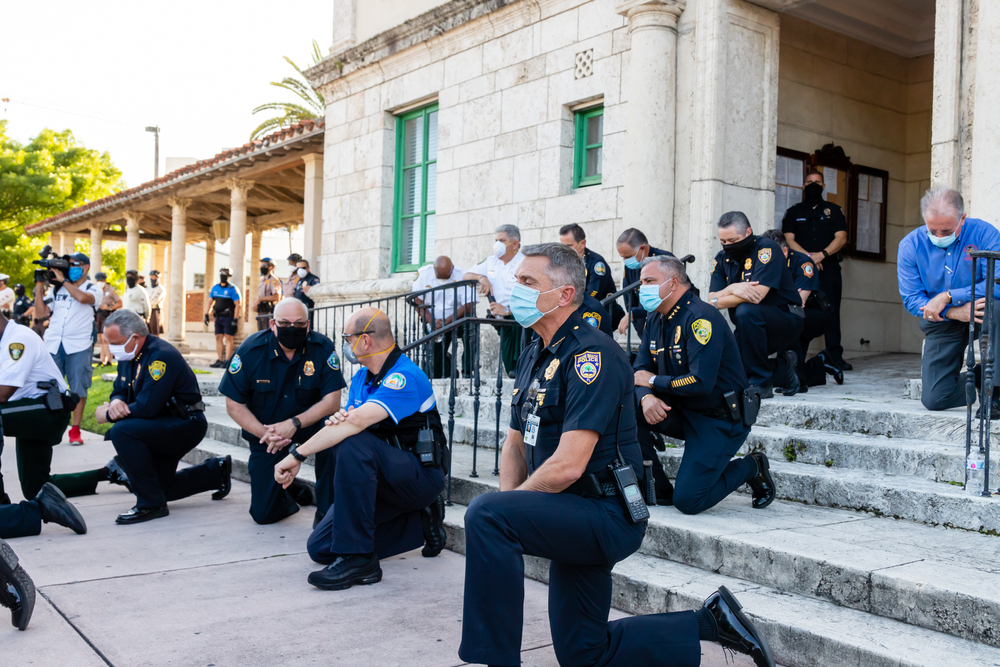As former Minneapolis police officer Derek Chauvin was found guilty of second-degree murder, third-degree murder, and second-degree manslaughter in April, attention has shifted to focus on the George Floyd Justice in Policing Act.
Introduced during last year’s Congress session, the George Floyd Justice in Policing Act would change how policing operates across the country. Named after a Black man who died while a police officer knelt on his neck, this act could revolutionize how police operate.
Reducing Racial and Religious Profiling
The act would forbid religious, racial and discriminatory profiling for all local, state and federal law enforcement while mandating anti-bias training for all levels of law enforcement. Further, this act would require that data such as the use of force be collected by race, sex, disability and religion be collected by law enforcement officials.
Banning Chokeholds and No-Knock Warrants
Should this act be passed and enacted, carotid holds and chokeholds would be banned for federal law enforcement officers. Funding for state and local law enforcement departments would be tied to whether these departments utilized chokeholds and carotid holds. In the case of federal drug cases, this act would ban no-knock warrants.
This act would require that all other de-escalation methods be tried and exhausted before the use of deadly force. Grants would be made available to local and state law enforcement agencies who exhausted non-lethal methods of de-escalation before potentially using lethal methods of force.
Requiring Body Cameras
The George Floyd Justice in Policing Act would require federal police officers in uniforms to wear body cameras. State and local law enforcement departments could use existing federal funding to ensure that body cameras were being used. As well, this piece of legislation would require identifiable federal police vehicles to have dashboard cameras. Many states currently have laws on the books requiring body cameras to be used.
Qualified Immunity
One of the challenges to prosecuting a police officer for their role in cases like George Floyd is the protective shield of qualified immunity. In the aftermath of incidents like George Floyd, Breonna Taylor, and Tamir Rice, police departments are under immense pressure to act by laying charges against officers. The George Floyd Justice in Policing Act would make it easier to prosecute officers by changing the mens rea (guilty mind) requirement in 18 U.S.C. Section 242 to a ‘recklessness’ standard from a ‘willfulness’ standard. This act would allow individuals to recover damages in civil court when their constitutional rights were violated by ending the protective qualified immunity shield.
Community Safety
This bill would re-imagine public safety by providing grants to community-based organizations. These grants are earmarked for local commissions and task forces to help develop concrete, actionable and equitable public safety programs. By investing in local, community-based programs, some of the power of law enforcement may be returned to communities in the interest of community public safety.
Additional attributes this act outlines include creating law enforcement development and training programs to develop best practices. This would raise the bar and provide consistent training programs for officers regardless of their location. A nationwide police registry would be established to track officers who have been fired or placed on leave due to disciplinary action. This would assist with holding police accountable for their previous actions should the actions result in the officer’s termination. This act would also make it a crime for federal law enforcement officers to engage in sexual activity with someone who has been arrested, in custody or detention.
The U.S. House of Representatives passed the George Floyd Justice in Policing Act in March. Since that time, Democrats and Republicans have continued discussing police reforms. Both sides of this issue have contradictory views on what and how much the federal government should do to stop the violence against Black Americans.
In 2020 Senator Tim Scott, a Republican from South Carolina introduced a bill similar to the George Floyd Justice in Policing Act that would reduce the use of chokeholds and no-knock warrants. Senator Scott’s bill did not change qualified immunity rules as the 2021 bill does. Democrats stated that Senator Scott’s bill was inadequate to meet the challenges outlined. In the last few weeks, the senator has proposed a compromise that would permit police departments to be the subject of civil lawsuits instead of individual officers.
As many U.S. cities have attempted to reform policing practices and reduced funding to police in the last year, neither the Democrats nor the Republican proposals would reduce police funding. The so-called activist campaign to defund the police is not being considered at the federal level.
There is no easy way to bring change to communities and all levels of law enforcement without collaboration and a willingness to work together. Many of the attributes of the George Floyd Justice of Policing Act aim to create a culture of collaboration between all levels of law enforcement and communities across the country.














